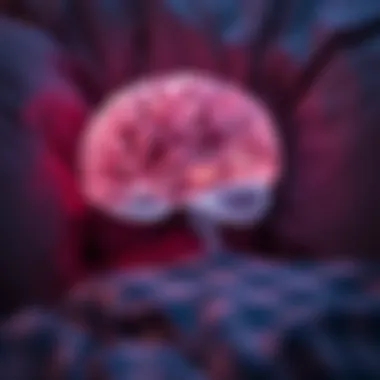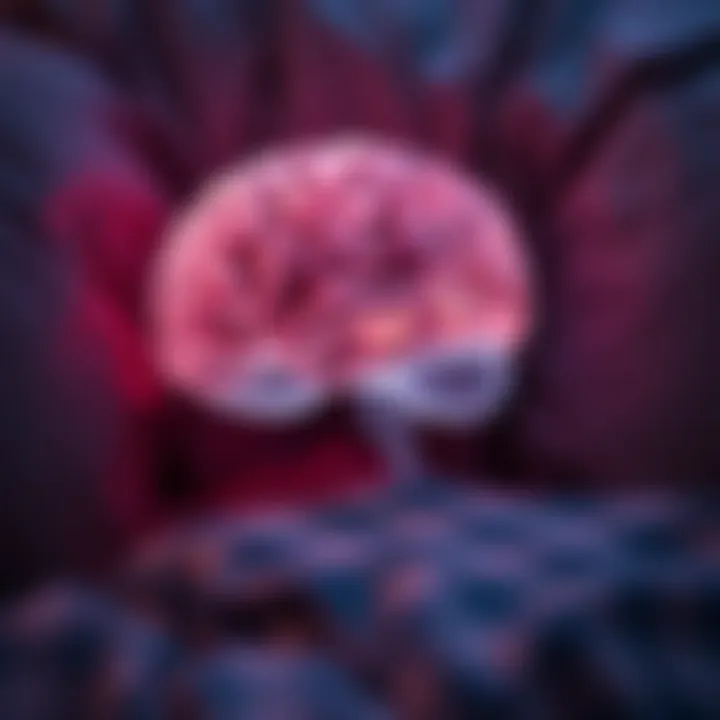ADHD and Sleep: Exploring the Connection with Oversleeping


Intro
The intricate links between mental health and sleep, especially concerning Attention Deficit Hyperactivity Disorder (ADHD), warrants a close examination. For those grappling with ADHD, sleeplessness or, conversely, excessive sleep can be a devious companion, influencing daily life in untold ways. This relationship isn’t just an incidental finding; it shows a deeper interplay of neurological and psychological aspects that shapes behavior and wellness. Understanding these nuances can illuminate paths that lead not only to improved sleep but also enhanced overall well-being.
Understanding Mental Health and Well-being
What is Mental Health?
Mental health represents a critical component of general well-being encompassing emotional, psychological, and social aspects. It informs how we think, feel, and act. It also aids in navigating stress, relating to others, and making choices. So, it stands to reason that any disruptions, like those found in ADHD, can create ripples through one’s mental state. In fact, people with ADHD may often navigate turbulent waters when it comes to managing emotions and thoughts.
The Importance of Prioritizing Mental Well-being
Prioritizing mental well-being translates into making choices that foster a positive state of mind. An essential component of this process lies in recognizing how disorders, such as ADHD, can distort perceptions and feelings about oneself, often leading to a cycle of stress and unhealthy habits. The correlation between mental health and sleep hints at the need for a holistic approach; reducing stress and enhancing sleep hygiene can lead to better outcomes on both fronts.
Common Mental Health Challenges and Disorders
ADHD is not an isolated challenge. Other prevalent mental health disorders, such as anxiety and depression, frequently accompany it. This intersection can lead to despairing situations, making the necessity for understanding and addressing sleep disturbances paramount. Excessive sleeping may be a coping mechanism, yet it prolongs the very cycle of fatigue and unproductivity that individuals strive to break. Recognizing this interplay can lead to targeted strategies that emphasize improving mental health while navigating sleep issues.
Strategies for Improving Mental Health
Self-care Techniques and Practices
Implementing self-care techniques becomes critical when addressing ADHD and its sidekick, excessive sleep. Simple habits, like maintaining a sleep diary, can drastically aid individuals in identifying patterns related to their sleep habits. Self-advocacy emerges as another vital self-care practice within this context.
- Start a sleep journal to track sleep patterns.
- Create a calming evening routine.
- Incorporate physical activity throughout the day.
Building Resilience and Stress Management
Building resilience is like sharpening the ax before tackling a tree. It fosters the adaptation to stressors, including ADHD-related challenges. Stress management techniques, like deep breathing or progressive muscle relaxation, serve as tools to mitigate anxiety and improve sleep quality, allowing for a more restful night.
Seeking Professional Help: Therapy and Counseling
While self-help strategies can lay a strong foundation, seeking professional guidance doesn't hurt. Cognitive Behavioral Therapy, or CBT, can be particularly effective for those with ADHD. This therapeutic approach centers on understanding thoughts that lead to feelings, ultimately guiding individuals away from harmful patterns that can negatively affect sleep.
Finding Balance in Life
Healthy Lifestyle Choices: Diet, Exercise, and Sleep
The triad of diet, exercise, and sleep plays an instrumental role in restoring balance. For individuals with ADHD, a diet rich in Omega-3 fatty acids and low in sugar may improve cognitive functions and sleep quality. Concurrently, regular exercise releases endorphins that could positively affect both mental health and excess sleep issues.
Mindfulness and Meditation Practices
On the importance scale, mindfulness and meditation span widely. These practices can anchor one’s thoughts, promoting calm and reducing racing thoughts. Just a few minutes a day can make a notable difference in shaping a more mindful mindset, subsequently improving both sleep quality and overall mental health.
Setting Boundaries and Managing Time Effectively
Establishing boundaries helps mitigate the stress that often threatens good mental health. Whether it’s learning to say no or carving out dedicated time for relaxation, effective time management becomes a shield against overwhelm. Balancing responsibilities and self-care aids in counteracting the seductive call of the pillow.
Enhancing Personal Development
Goal Setting and Productivity Tips
Individuals looking to enhance productivity need not throw themselves into chaos. Smart goal setting, where one sets Specific, Measurable, Achievable, Relevant, and Time-bound objectives, can pave the way for achievements without the toll on mental well-being. This clarity is essential for those already battling ADHD, as it can reduce feelings of being overwhelmed.
Building Healthy Relationships and Social Connections
Surrounding oneself with supportive people cascades into bolstered mental health. Healthy relationships provide necessary support, motivation, and perspective, especially during challenging times, making it essential for individuals with ADHD to nurture meaningful connections.
Practicing Gratitude and Positivity
Shifting the focus from stress to appreciation transforms perceptions. Practicing gratitude helps counteract feelings of negativity and promotes a healthier mindset. Emphasizing daily positives, no matter how small, snowballs self-esteem and motivation, serving as a buffer against hopelessness.
Tips for Maintaining Mental Well-being
Strategies for Preventing Burnout
Awareness is the first step in preventing burnout. Recognizing personal limits becomes critical, especially in high-pressure situations often faced by individuals with ADHD. Having contingency plans in place can alleviate stress and stave off feelings of overwhelm.
Coping with Challenges and Setbacks
Coping strategies should not be one-size-fits-all; what works for one person may not for another. Tailoring approaches tailored to personal triggers can make all the difference in developing resilience in the face of ADHD-related challenges.
Creating a Supportive Environment
Lastly, cultivating a supportive environment is vital. This goes beyond physical surroundings; it's about setting up a space that fosters emotional and mental stability. Open communication with family and friends about ADHD and sleep issues can invite understanding and forge a pathway for effective support.
Sleep disturbances, especially in those with ADHD, are not merely inconveniences—they represent deeper issues worth unpacking.
By marrying mental health efforts with strategies addressing sleep, individuals can start untangling the web of challenges associated with ADHD. Delving into the links between sleep and mental health is a step toward not just understanding but fostering a balanced and fulfilling life.
For more resources on ADHD and mental health, visit Wikipedia, Britannica, or Mental Health.gov.
Engaging with community platforms like Reddit may also offer real-life experiences and shared strategies.
ADHD Overview


Understanding ADHD, or Attention Deficit Hyperactivity Disorder, is pivotal in the context of this article due to its significant impact on both mental health and sleep patterns. By delving into the foundations of ADHD, we can better comprehend the intricate links between the disorder and excessive sleeping. Let’s take a closer look.
Definition of ADHD
ADHD is a neurodevelopmental disorder characterized primarily by patterns of inattention, hyperactivity, and impulsivity. People diagnosed with ADHD might experience difficulty in maintaining focus on tasks, which can influence various aspects of their lives, including academic performance and personal relationships. This disorder is generally diagnosed in childhood, but symptoms can persist into adulthood. Many adults with ADHD don’t realize they have it, leading them to cope with challenges unrecognized and unaddressed.
Symptoms and Diagnosis
The symptoms of ADHD vary of course from one person to another. Common signs include:
- Inattention: Frequently making careless mistakes, difficulty organizing tasks, and avoiding activities that require sustained mental effort.
- Hyperactivity: Fidgeting, restlessness, and difficulty remaining seated in situations where it’s expected.
- Impulsivity: Interrupting others, difficulty waiting for one’s turn, or blurting out answers before questions are completed.
Diagnosing ADHD is not always straightforward. It often involves a thorough evaluation by a psychologist or psychiatrist who may use checklists, interviews, and behavioral assessments to identify the presence of symptoms. The assessment process considers various aspects, including a detailed history of the individual’s functioning at home, school, and work.
Prevalence Rates
ADHD is quite common, affecting millions worldwide. Recent studies suggest that approximately 5% of children and 2.5% of adults are diagnosed with ADHD. These figures can vary based on factors like geographical location and socio-economic conditions. For instance, boys are diagnosed more frequently than girls, though it is believed that many girls may go undiagnosed due to presenting symptoms that differ from the traditional hyperactive profile.
"Understanding ADHD is not just about recognizing symptoms; it’s about acknowledging the lived experiences and challenges of individuals who navigate life with this disorder."
In sum, grasping what ADHD is catalyzes a deeper understanding of its effects, particularly related to sleep issues, including excessive sleeping. This overview sets the stage for exploring how ADHD affects sleep patterns and the wider implications for mental health.
The Role of Sleep in Mental Health
Sleep plays a pivotal role in maintaining mental health and overall well-being. Adequate sleep is not just about feeling rested; it significantly impacts how we think, feel, and behave. For individuals with ADHD, the relationship with sleep can be even more complex, as overlapping symptoms and sleep issues may exacerbate mental health challenges.
One key aspect of sleep's role in mental health is its influence on emotional regulation. When sleep is lacking, it can lead to irritability, anxiety, and even symptoms of depression. This becomes particularly crucial for those managing ADHD, where emotional dysregulation is often a core concern. A well-rested mind is more equipped to face daily challenges, making sleep hygiene an essential focus for anyone prioritizing mental wellness.
Importance of Sleep
Understanding the importance of sleep is like recognizing the cornerstone of a building. Proper sleep hygiene contributes to cognitive functions such as memory consolidation, problem-solving abilities, and daily concentration. The brain clears out toxins during sleep, allowing it to function at its best. For individuals with ADHD, this means that quality sleep can help alleviate some of the cognitive challenges often faced during waking hours.
Moreover, research suggests that those who experience sufficient restorative sleep often report improved mood and better social interactions. So, for someone with ADHD, achieving restful sleep could translate into having a clearer mind and more stable emotional responses. In addition, it is vital to recognize that the length of sleep is not all that matters – the quality does, too.
Sleep Architecture and Quality
Sleep is not a one-size-fits-all package; rather, it involves a series of cycles that the body goes through during the night. Sleep architecture refers to these cycles, which include various stages such as light sleep, deep sleep, and REM sleep. Each stage serves a unique purpose. For instance, deep sleep is when our body repairs and revitalizes its systems, while REM sleep plays a critical role in memory and emotional processing.
Poor sleep architecture, often seen in people with ADHD, can disrupt this balance. The inability to move through these stages effectively may lead to fragmented sleep, ultimately affecting mood, focus, and overall mental health. For those with ADHD, inconsistent sleep patterns can contribute to difficulties in concentration and the management of impulsive behaviors. Ensuring a good quality of sleep is hence imperative, as it allows the body and mind to regroup and reset.
Effects of Sleep Deprivation
Sleep deprivation is nothing to sniff at, especially for individuals with ADHD. Lack of sleep can serve as a harmful agent that aggravates the symptoms associated with ADHD. Many studies indicate that insufficient sleep can lead to increased reliance on hyperactive and impulsive behaviors as a coping mechanism for inattentiveness.
Furthermore, the cognitive consequences of sleep deprivation can be quite serious. Individuals may experience heightened difficulties with executive functioning— the ability to plan, organize, and manage tasks. This forms a vicious cycle: ADHD can complicate sleep, and inadequate sleep can worsen ADHD symptoms.
- Some of the most common effects of sleep deprivation include:
- Decreased attention span
- Impaired memory function
- Heightened emotional responses
- Increased anxiety levels
Recognizing these effects is crucial because it highlights the necessity for individuals with ADHD to prioritize their sleep. Without addressing sleep issues, it becomes increasingly difficult to manage ADHD symptoms effectively.
ADHD and Sleep Patterns
Understanding the link between Attention Deficit Hyperactivity Disorder (ADHD) and sleep patterns is pivotal, particularly because sleep quality can substantially influence overall mental well-being. For individuals with ADHD, disturbances in sleep can echo throughout their waking hours, affecting not just their productivity but their emotional stability and social interactions too.
Individuals with ADHD often find themselves entangled in a web of sleep-related struggles that stem from the symptoms of the disorder itself. Factors like impulsivity, hyperactivity, and inattention can lead to inconsistent sleep schedules, or even an inability to wind down at night, which is crucial for a restful night’s sleep. This fluctuation in sleep patterns can introduce challenges ranging from fatigue to increased difficulty in concentrating, creating a vicious cycle that is hard to break.
Key considerations when exploring ADHD and sleep patterns include:
- The extent to which ADHD symptoms interfere with sleep hygiene.
- The reciprocal relationship between sleep disturbances and heightened ADHD symptoms.
- The importance of understanding how sleep difficulties can exacerbate the functional impairments typically faced by individuals with ADHD.
By adequately addressing the interplay of ADHD and sleep, we can better comprehend the holistic approach needed for effective treatment. This sheds light on the significance of promoting sound sleep practices as part of a comprehensive management plan for ADHD.
Common Sleep Disturbances
People with ADHD often face a myriad of sleep disturbances that manifest in different ways. While insomnia is a well-known culprit, other sleep issues also emerge, complicating matters further.
- Difficulty Falling Asleep: Many with ADHD struggle to disengage from their thoughts or physical restlessness, leading to long periods of tossing and turning. The brain might be in overdrive, causing their mind to race, making it hard to relax.
- Restless Legs Syndrome: This condition can be particularly bothersome, leading to an unbearable urge to move the legs while at rest. Its impact on sleep shouldn't be underestimated, considering how it can send individuals jumping out of bed repeatedly.
- Frequent Night Wakings: Individuals may find themselves waking sporadically throughout the night, which interrupts the deep sleep necessary for refreshing rest. Such an experience can significantly reduce the quality of sleep, leading to increased daytime fatigue.
- Sleep Walking or Nightmares: Frightening dreams and sleepwalking episodes are not uncommon in those with ADHD. The consequences of a poor night's sleep can extend into the following day, exacerbating ADHD symptoms.
The varied nature of these disturbances can profoundly influence not just the quality of sleep, but also the emotional regulation and cognitive function of those affected.
Correlation Between ADHD and Insomnia
Insomnia stands out as a prominent sleep disorder among individuals with ADHD, creating a complex relationship that complicates both conditions. The characteristics of ADHD can set the stage for insomnia in multiple ways:
- The inability to concentrate can cause racing thoughts, making it nearly impossible to settle down for the night.
- Individuals may experience heightened anxiety levels as a result of their ADHD, which can also keep them awake.
Research indicates that insomnia can worsen ADHD symptoms like irritability and inability to focus, which in turn exacerbates the sleep problem. This cycle is not just an unfortunate coincidence; it's a struggle that many face daily.
"Inadequate sleep can amplify ADHD symptoms, leading individuals into a relentless cycle of sleep struggles and cognitive challenges."
Sleep Apnea and ADHD
One often overlooked aspect of ADHD is its potential correlation with obstructive sleep apnea (OSA). OSA involves interruptions in breathing during sleep due to airway obstruction. Its signs, such as loud snoring and gasping for air, can be acutely disruptive to the sleep cycle.
- Increased Risk: People with ADHD may already have heightened levels of impulsivity and hyperactivity, and the fatigue from sleep apnea can exacerbate these behaviors.
- Impact on Diagnosis: Misinterpretation is another concern; fatigue resulting from OSA may be mistaken for core symptoms of ADHD, leading to potential misdiagnosis or incomplete treatment approaches.
- Intervention Necessity: Recognizing and treating sleep apnea can significantly enhance overall sleep quality and consequently reduce ADHD symptoms.


Understanding the connection between ADHD and sleep patterns, particularly concerning common disturbances, insomnia, and apnea, is crucial. Acknowledging these challenges is the first step to developing better management strategies, ultimately leading to improved outcomes for those living with ADHD.
Understanding Excessive Sleep in ADHD
Understanding the intricate relationship between ADHD and excessive sleep is crucial in addressing the broader implications related to mental health and wellness. Individuals diagnosed with ADHD often face challenges that go beyond mere attention difficulties; one significant aspect that frequently emerges is the tendency to oversleep.
This phenomenon is not just about having a few extra hours in bed. It can significantly impair daily functioning, interpersonal relationships, and overall quality of life. Recognizing the role that excessive sleep plays within the ADHD spectrum provides beneficial insights into lived experiences of those affected. Through a closer examination, various elements come to light.
- Awareness: Identifying oversleeping can empower individuals and caregivers to seek tailored solutions.
- Connection: Establishing a link between sleep patterns and ADHD symptoms might lead to better management strategies.
- Holistic Approach: A deeper understanding fosters a more comprehensive approach to ADHD treatment, addressing not only attentional issues but also sleep-related concerns.
In light of these considerations, let’s delve deeper into the various aspects of excessive sleep for those with ADHD.
Identifying Oversleeping
Oversleeping can often be overlooked or mistaken for other issues. It's not merely about sleeping longer than usual; it's tied to specific behaviors and patterns. Typical signs of oversleeping include:
- Extended Sleep Duration: Regularly sleeping over the recommended amount, which is generally around 7-9 hours for most adults.
- Daytime Fatigue: Waking up feeling groggy and still tired can indicate interrupted sleep quality rather than quantity.
- Disruption of Daily Activities: Oversleeping often leads to difficulties in maintaining a productive schedule, ultimately affecting work or study obligations.
Being cognizant of these indicators helps in recognizing when sleep might be tipping towards excessive, offering a pathway to address sleep management in ADHD sufferers.
Potential Causes of Excessive Sleep
There are several reasons behind why individuals with ADHD experience excessive sleep. Understanding these factors can help tailor interventions significantly:
- Medication Side Effects: Some medications prescribed for ADHD, like stimulants and mood stabilizers, might contribute to sleepiness as a side effect.
- Emotional Exhaustion: The constant struggle to focus and adhere to daily tasks can lead to mental fatigue, prompting individuals to seek refuge in sleep as a form of respite.
- Irregular Sleep Patterns: Individuals with ADHD often have inconsistent sleep schedules, leading to bouts of excessive sleep in an effort to recuperate from sleep debt.
Psychological Factors
Several psychological elements can also impact sleep duration:
- Anxiety: Individuals with ADHD may struggle with anxiety, which can disrupt sleep cycles, leading to oversized recovery sleep periods later.
- Depression: Co-occurring depressive symptoms can cause fluctuations in energy levels, leading to either excessive sleep or insomnia.
- High-Stress Lifestyle: The constant challenges of managing ADHD symptoms can contribute to heightened stress levels, again pushing individuals toward excessive sleeping as an escape.
These psychological influences are paramount in understanding why ADHD patients may resort to oversleeping as a coping mechanism.
Biological Influences
The biological underpinnings regarding ADHD and sleep are complex:
- Brain Chemistry: Neurotransmitters, such as dopamine, play a significant role in both ADHD and sleep regulations. The imbalance may contribute extensively to disrupted sleep habits and increased sleep needs.
- Circadian Rhythm Disruption: Individuals with ADHD may experience altered circadian rhythms, meaning their body clocks don’t align well with societal norms, potentially causing misalignments in sleep timing and duration.
- Sleep Disorders: Conditions such as sleep apnea or restless leg syndrome appear more frequently among individuals with ADHD, which can lead to increased sleep requirements as the body attempts to compensate for poor sleep quality during the night.
Understanding these biological components can be invaluable in developing effective management plans tailored to mitigate excessive sleep in ADHD patients.
By considering this multi-dimensional lens—ranging from identification to psychological and biological evaluations—we can better understand and address excessive sleep within the context of ADHD. This holistic view fosters a pathway to improved strategies and interventions for those affected.
Impact of Lifestyle on Sleep in ADHD
Understanding how lifestyle choices affect sleep is crucial, especially for those dealing with ADHD. People with ADHD often grapple with unique challenges that can amplify sleep issues. Factors like what we eat, how much we move, and how we use screens have a significant influence on sleep quality and overall health. By recognizing the role that lifestyle plays in sleep management, individuals and caregivers can adopt strategies that pave the way for better rest and improved daily functioning.
Diet and Nutrition
Diet can make or break the sleep experience for anyone, but it holds particular weight for individuals with ADHD. Nutritional choices can impact energy levels and mood throughout the day, which in turn affects sleep quality at night. For instance, diets high in processed sugars and caffeine can leave a person feeling jittery and restless, complicating their ability to unwind. On the other hand, foods rich in omega-3 fatty acids, such as salmon and flaxseed, or magnesium-rich foods like nuts and leafy greens can promote relaxation and better sleep. Incorporating a balanced diet and maintaining consistent meal times also help regulate the body's internal clock.
"You are what you eat" is not just a saying; it’s a mantra for better sleep, especially for those affected by ADHD.
To support sleep, consider adopting some of these dietary approaches:
- Incorporate complex carbohydrates like whole grains which release serotonin, a sleep-inducing hormone.
- Limit caffeine and sugar intake, particularly in the afternoon and evening.
- Stay hydrated, but be mindful of fluid intake before bedtime to minimize nighttime trips to the bathroom.
Physical Activity
Engaging in regular physical activity is a powerful tool that can boost sleep quality for those with ADHD. Exercise helps to reduce hyperactivity and anxiety, which are common concerns in ADHD. The release of endorphins from physical activity can also improve mood and lessen feelings of restlessness. Whether it’s a brisk walk, a dance class, or a leisurely bike ride, any form of movement can encourage better sleep patterns. The key is to aim for moderate exercise consistently, ideally not too close to bedtime, as intense workouts right before sleep can have the opposite effect.
Another layer to consider is that the type of exercise might resonate differently with individuals:
- Aerobic exercises (like running or swimming) significantly improve sleep for many individuals.
- Strength training exercises can also help with relaxation and sleep but may vary in effectiveness.
- Mind-body practices, such as yoga or tai chi, blend physical movement with mindfulness, promoting a calmer state of mind.
Screen Time and Sleep Hygiene
In today’s digital age, screen time deserves special mention due to its undeniable impact on sleep quality. For individuals with ADHD, excessive exposure to screens—like smartphones or computers—can lead to overstimulation that's hard to shake off. The blue light emitted by screens interferes with melatonin production, the hormone responsible for regulating sleep. This effect can heighten the struggle many face in switching off for the night.
To improve sleep hygiene, it’s vital to establish boundaries around screen usage. Here are some practical tips:
- Set a “screen curfew”, shutting down all electronics at least an hour before bedtime to help the mind unwind.
- Create a calming sleep environment by keeping the bedroom dark and cool, reducing noise, and using the space solely for sleep and relaxation.
- Engage in relaxing activities before bed, such as reading a book, listening to soothing music, or practicing deep breathing exercises.
Achieving sound sleep is often a balancing act, particularly for those with ADHD. Making mindful choices surrounding diet, physical activity, and screen time can help steer the ship toward smoother waters in sleep quality and overall well-being.
Strategies for Better Sleep Management
Understanding the strategies for better sleep management is crucial, especially for individuals navigating the complexities of ADHD. Sleep issues often compound the challenges faced by those with ADHD, leading to a vicious cycle of poor rest contributing to heightened symptoms. Implementing effective strategies can disrupt this cycle, fostering improved concentration, emotional regulation, and overall well-being.
Establishing a Sleep Routine
Creating a consistent sleep routine can serve as a bedrock for anyone wanting to achieve better sleep, particularly those with ADHD. This means going to bed and waking up at the same time every day, even on weekends. It signals the body when it’s time to wind down and when to rise, making it easier to slip into slumber naturally.
Some practical steps for establishing a sleep routine include:
- Set a wind-down time: Start preparing for sleep an hour before bed, avoiding screens and stimulating activities.
- Create a bedtime ritual: Engage in calming activities like reading or taking a warm bath.
- Limit naps: If daytime sleep is necessary, keep it short (20-30 minutes) and early in the day to avoid disrupting nighttime sleep.


By being consistent, one allows their body clock to sync over time, making falling asleep less of a battleground.
Cognitive Behavioral Therapy for Insomnia (CBT-I)
Cognitive Behavioral Therapy for Insomnia (CBT-I) stands as a beacon for those struggling with sleep disturbances. This structured program helps individuals identify and replace thoughts and behaviors that cause or worsen sleep issues. It operates on the premise that the mind can conspire against good sleep by ruminating over worries and fears.
What usually occurs in CBT-I includes:
- Cognitive restructuring: Challenging negative beliefs about sleep and replacing them with more constructive thoughts.
- Sleep restriction therapy: Limiting the amount of time spent in bed to increase the drive to sleep, gradually increasing it as sleep efficiency improves.
- Sleep hygiene education: Learning about the environmental and behavioral factors that influence sleep positively.
Several studies suggest that CBT-I is effective for people with insomnia, including those whose symptoms are exacerbated by ADHD, making it a worthwhile avenue to explore.
Medication Considerations
When it comes to managing severe sleep issues related to ADHD and excessive sleeping, medication can sometimes play a role. However, it’s vital to approach this path thoughtfully. Not all medications work the same for everyone, and some may cause adverse effects, particularly if they're already managing ADHD medications.
Key considerations when contemplating sleep medications:
- Consult a healthcare provider: Always seek advice from a professional who understands your medical history and medication regimen.
- Evaluate potential side effects: Sedative effects can linger into the day, potentially worsening ADHD symptoms.
- Explore alternatives first: Non-pharmacologic strategies should often be tried first before considering prescription medications.
Ensuring an open dialogue with healthcare professionals can help in tailoring an effective and safe sleep management plan.
Mindfulness and Relaxation Techniques
Incorporating mindfulness and relaxation techniques can offer profound benefits for improving sleep quality among individuals suffering from ADHD. These methods act as tools to calm an overactive mind, making it easier to transition into restful sleep.
Practices that can be helpful include:
- Meditation: Practices like guided imagery or deep breathing exercises can significantly reduce anxiety, creating a peaceful mindset before bed.
- Yoga or stretching: Gentle movements can release physical tension and promote relaxation through increased blood flow and muscle relaxation.
- Progressive muscle relaxation: This technique involves tensing and relaxing muscle groups in a systematic way to foster a sense of deep relaxation.
Engaging in these techniques regularly can transform one's winding down routine into a rejuvenating experience, paving the way for sweet slumber.
In summary, managing sleep for individuals with ADHD requires a multi-faceted approach. Establishing a solid routine, utilizing cognitive behavioral strategies, considering medication judiciously, and embracing mindfulness practices can significantly influence both sleep quality and overall mental health.
When to Seek Professional Help
Determining when to seek professional help is crucial for individuals experiencing excessive sleep related to ADHD. Ignoring the signs can lead to further complications. In this section, we will outline key considerations, benefits of seeking help, and what to expect from professional consultations.
Recognizing Signs of Sleep Disorders
Awareness is the first step. Individuals with ADHD should pay attention to notable changes in their sleep patterns. Signs of sleep disorders include:
- Difficulty falling asleep or staying asleep
- Waking up frequently during the night
- Feeling excessively sleepy during the day
- Snoring loudly or gasping for air while sleeping
- Noticing a chronic lack of energy despite sleeping longer hours
If these symptoms resonate with you or your loved ones, it’s time to act. Recognizing these signs is not just about acknowledging the problem; it’s about understanding the impact on daily functioning. Excessive sleep can lead to other issues, like compromised concentration, irritability, and emotional dysregulation, which often aggravate ADHD symptoms. Ignoring it won’t make it better; knowing the signs empowers individuals to take the next step.
Consultation with Specialists
Consulting with a healthcare provider or sleep specialist can yield insights tailored to the specific needs of those with ADHD. Professionals can perform sleep studies to diagnose issues like sleep apnea or insomnia. Here are some potential professionals to consult:
- Family doctors
- Psychiatrists who understand ADHD
- Sleep specialists
During consultations, a nuanced approach is often necessary. Expect a mix of questions covering sleep history, behavioral patterns, and possibly physical examinations. The goal is to develop a holistic view of how ADHD is influencing sleep, along with the best tailored interventions.
Importance of Individualized Approaches
One-size-fits-all solutions rarely work when dealing with ADHD and sleep disorders. Each individual has unique experiences and challenges. Hence, customization is key. Here’s why individualized approaches matter:
- Different Symptoms: ADHD can manifest diversely among individuals; thus, symptoms related to sleep can vary widely.
- Tailored Treatments: What works for one person may not work for another. Specialized strategies, such as medication adjustments or behavioral therapies, must be aligned with personal experiences.
- Monitoring Progress: Continuous assessment allows for changes in strategy over time, addressing evolving needs.
In essence, the journey of addressing excessive sleep in ADHD is deeply personal. Seeking professional help is not just about addressing the symptoms but understanding the individual in their entirety.
A customized approach can illuminate the path towards better sleep hygiene and overall mental well-being, ultimately amplifying the quality of life.
To enrich your understanding, consider exploring resources from Mayo Clinic, or National Sleep Foundation for practical advice and deeper insights into sleep disorders.
Future Directions in ADHD Research
The link between Attention Deficit Hyperactivity Disorder (ADHD) and excessive sleep is an evolving area of study. As understanding deepens, researchers are shifting focus toward future directions that may offer fresh insights into the interplay of these two complex phenomena. Emphasizing this topic not only illuminates potential avenues for therapeutic interventions but also highlights the pressing need for a multifaceted approach to ADHD management.
Longitudinal research will play a vital role in furthering the understanding of sleep patterns in individuals with ADHD. By following a cohort over an extended period, researchers can track changes in sleep habits, mood, and cognitive function, unveiling trends that short-term studies might miss. This approach offers a more dynamic view of how ADHD impacts sleep and the long-term consequences of oversleeping.
Longitudinal studies can provide deeper insights into the temporal relationships between ADHD symptoms and sleep disturbances.
Longitudinal Studies on Sleep Patterns
One promising avenue is the implementation of longitudinal studies that explore sleep irregularities over time. These studies offer a window into how sleep habits evolve alongside ADHD symptoms, illuminating patterns often obscured in cross-sectional analyses. For instance, they can reveal whether changes in sleep duration correlate with heightened attention difficulties or mood variations, thus allowing a clearer understanding of the cause-and-effect relationship.
Furthermore, tracking sleep participants can lead to identifying critical periods in a person’s development when sleep becomes particularly relevant for managing ADHD symptoms. For instance, if it's observed that certain age groups exhibit more significant changes in sleep length or quality in relation to ADHD, targeted interventions could be designed around those developmental phases. This approach is essential not just for theoretical understanding but can lead to practical strategies that align sleep interventions with the natural course of ADHD.
Genetic Studies Linking Sleep and ADHD
There is growing interest in exploring genetic factors that may underlie both ADHD and sleep patterns. Understanding the hereditary elements brings a new layer of complexity to the discussion. For example, research into specific genetic markers associated with both conditions could help clarify whether sleep disruptions in ADHD are a direct result of genetic predisposition.
Investigating genetic studies may uncover links between neurotransmitters involved in ADHD and those regulating sleep cycles. It's hypothesized that if certain genes impact an individual’s sleep architecture, they might also affect their susceptibility to ADHD. This duality suggests that treatment approaches which address both genetic vulnerabilities could be particularly effective, further bolstering the rationale for integrated therapies for ADHD and sleep disturbances.
Emerging Therapies and Interventions
Another exciting direction is the exploration of emerging therapies and interventions tailored for individuals exhibiting both ADHD and sleep issues. While traditional treatments typically prioritize ADHD symptoms, there's a growing understanding of the need for a holistic approach that addresses the entire individual's well-being.
New therapies might range from behavioral interventions that promote better sleep hygiene to pharmacological advancements targeting specific neurotransmitter pathways affected by both conditions. For instance, melatonin or other sleep aids may be synergistically combined with ADHD medications to enhance both attention and sleep quality.
Incorporating mindfulness practices and cognitive-behavioral strategies also shows promise. These methods can not only help in managing ADHD symptoms but also promote better sleep habits. Incorporating such strategies could encourage a more comprehensive treatment plan, ultimately benefiting individuals grappling with the intricate link between ADHD and excessive sleep.















